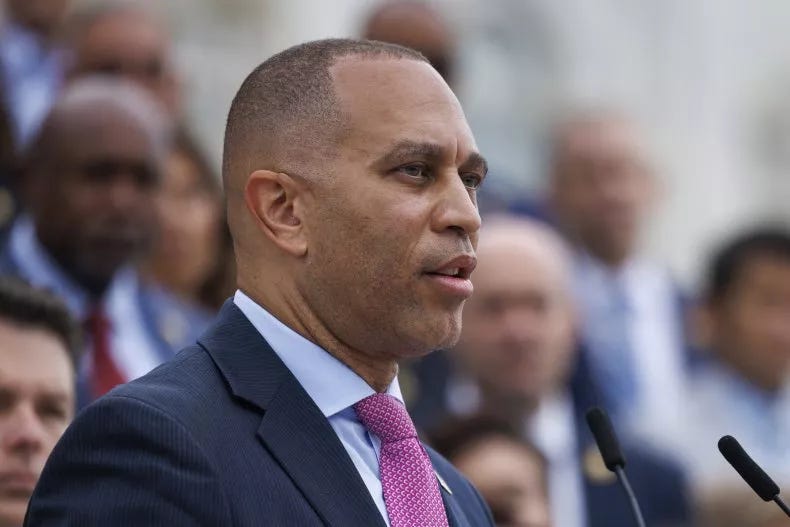When, not win: Democrats split over which election matters most
Weeks after a DSA-backed upset in NYC, progressive activists are pressuring Democratic leaders to channel grassroots energy into bolder resistance just as party strategists dig in for the midterms.

First Things First
👋🏾 Hi, hey, hello! Welcome to Congress Nerd, the flagship newsletter from Once Upon a Hill, where I break down the week’s biggest congressional storylines and chronicle the politics, policy and power players shaping the Democratic Party in the Trump 2.0 era.
If you haven’t already, consider upgrading to a paid subscription to unlock the Sunday edition I publish weekly when Congress is in session. It’s packed with smart scoops, floor previews and what I’m tracking on the Hill to help you create the change you want to see.
In tonight’s edition, Democrats mount a unified defense of DEI, Cortez Masto’s gambling bill hits a GOP wall, Texas faces staggering flood losses, the Senate braces for a rescissions clash, Trump escalates his trade war and a judge blocks a key provision targeting Planned Parenthood.
But let’s start with the brewing fight between Democrats playing to win power in Washington and those trying to redefine what power should look like in the first place.
The Mamdani split screen
IN THE WEEKS since Assemblymember Zohran Mamdani’s surprise victory in New York City’s Democratic mayoral primary, online calls to challenge establishment Democrats—including House Minority Leader Hakeem Jeffries (D-N.Y.)—have intensified.
They reflect a deeper frustration with the Democratic establishment’s posture in the Trump 2.0 era. Many online activists view Jeffries, Senate Minority Leader Chuck Schumer (D-N.Y.), and other longtime incumbents as insufficiently equipped—or unwilling—to meet the moment. Mamdani’s victory is being read not as a fluke, but as evidence of a generational and ideological shift: Younger voices are increasingly drawn to socialist policies they believe can redress the failures of American capitalism, from rising housing costs and medical debt to stagnant wages and much more. And amid a mounting affordability crisis in New York and beyond, progressive Democrats argue that party leaders remain too beholden to corporate interests to advance the bold, redistributive agenda the moment demands.
But a closer look at the tension between the two camps reveals that both are focused on elections, just different ones. Jeffries, Schumer, and most national Democrats are laser-focused on flipping both chambers of Congress in 2026 to check President Donald Trump’s power. (While Democrats are expected to fall short of the four seats they would need to retake the Senate given their brutal map, the House is viewed as a much more viable path back to power.) Progressive activists, meanwhile, are looking to this fall, when a Mamdani general election win could redefine what leadership in the Democratic Party looks like.
“Look, I think there’s clearly a seismic shift happening online in terms of young energy behind Mamdani and just generally the [Democratic Socialists of America] in New York City,” a source close to Democratic leadership told me. “There are a lot of young, energetic progressives that like him and feel energized by the idea of the victory that they had and if you are a member of Democratic leadership, that’s something you have to consider.”
The source, who was granted anonymity to discuss the situation, added that Mamdani’s relentless focus on affordability parallels what Trump successfully said and did on the campaign trail in 2024.
“Of course, Trump has done nothing to drive down those prices and the system is rigged for people like him and by people like him, and so obviously that’s the difference,” the source said. “But I think people in New York City are generally pissed off about the cost of living among other things.”
A House Democratic strategist argued there’s less daylight between Jeffries and Mamdani than the leader’s absence of a formal endorsement might suggest.
“He’s been smart to focus on the fact that Mamdani ran a good campaign against a candidate who ran a lazy, arrogant and presumptive one,” the strategist said. “If there’s anything that should inform House Democrats is don’t run lazy fucking campaigns. You’ve got to engage people on the things that you know matter where you’re running, and run an actual campaign without assuming that you’re going to get reelected because people know your name or you've been there for a while. We’re just not in that kind of environment anymore. Full stop, period.”
JEFFRIES AND SCHUMER represent a group of elected Democrats, campaign professionals and aligned outside groups who are deeply rooted in the real-world electoral and institutional constraints of governing from the minority—including the Senate filibuster, conservative courts and gerrymandered maps—and are trying to operate within those realities. Sources I spoke to said that doesn’t mean these politicians aren’t progressive in many cases, but that they prioritize feasible outcomes over symbolic ones.
Then there’s a digital vanguard: progressive activists, influencers, and highly engaged online users clustered on platforms like X, TikTok, Threads, and Discord. Their core demands include more aggressive confrontation with Trump, Republicans and conservative institutions—paired with a clearer moral narrative around race, gender and inequality. This camp often insists on policy purity, especially around Medicare for All, the Green New Deal, student debt cancellation, Gaza, and police and prison abolition—positions that are less palatable outside deep-blue enclaves. Visible resistance is the currency of this coalition, often measured by inflammatory rhetoric, procedural brinkmanship and a willingness to reject bipartisan norms.
Members of this faction frequently accuse elected Democrats of being too weak, too compromising or too concerned with decorum. Their asks are rarely tethered to vote counts or institutional constraints. They’re more interested in what resistance looks like, even if it is symbolic or lacks a clear legislative path forward.
The goal isn't electoral power for a growing slice of the online left. It’s vindication for what they see as past betrayals by the Democratic establishment, from Gaza to the Bernie years. Within that framework, taking down Jeffries—never mind if it weakens the broader Democratic coalition—isn’t collateral damage. It’s the point.
The anger toward Jeffries, Schumer and others reflects a deeper loss of faith in institutional Democratic leadership. Many younger, progressive and extremely online voters now view the establishment not simply as out of touch but also as an obstacle to justice. In the incentive structure of digital politics, confrontation is rewarded far more than coalition-building. Calling out prominent Democrats generates more engagement than explaining the tradeoffs of compromise or the limits of legislative math. That’s how you get a political environment where primarying Jeffries receives more attention than defeating Republicans like Mike Lawler or Nick LaLota and where deep Medicaid cuts in the GOP megabill trigger less outrage than, say, Rep. Yvette Clarke’s hesitation to endorse Mamdani.
In this context, resistance becomes performance shaped by visibility, volume, and moral vibes. The goal is to sound like an opponent of oppression, even if that comes at the cost of flipping districts or protecting Black, Latino and Asian Democrats in frontline seats. Meanwhile, Republicans just passed sweeping legislation slashing Medicaid, targeting Planned Parenthood and advancing Trump’s second-term agenda. Yet much of the online energy is focused not on flipping GOP seats, but on punishing Democrats viewed as impediments to the movement.
Both sides believe they’re fighting for the party's future, but the path forward is riddled with risk. If the activist left turns away from electoral politics or against moderate Democrats, the coalition could fracture in key races just as MAGA tightens its grip on power. But if Washington Democrats continue to downplay the moral urgency felt by younger voters and communities of color, they risk eroding trust and long-term engagement. The challenge is whether the party can harness both instincts: Grounding its pragmatism in conviction and channeling activist energy into achievable goals.
Want to reach the people shaping policy and politics? Once Upon a Hill puts your message in front of the Capitol’s most plugged-in audience—where influence meets insight. Let’s talk about how a sponsorship can align with your goals. Email michael@onceuponahill.com to learn more.
JEFFRIES, IN PARTICULAR, has tried to walk the line of embracing pluralism, emphasizing representation and insisting that pragmatism and principle aren’t mutually exclusive. To some, though, his very posture is seen as a betrayal.
But Jeffries’ team has gone on the offensive.
Senior adviser Andre Richardson has made clear that any primary threat will be met with what he called a “forceful and unrelenting” response. In a pointed statement to CNN, Richardson labeled Jeffries’ critics “Team Gentrification,” a reference to what he framed as progressive critics out of step with working-class voters of color, and warned that if the leader is targeted, he won’t just defend incumbents—he’ll go after Brooklyn DSA members in the state legislature as well. (Richardson’s current pinned post on X highlights Jeffries’ 6–0 record since 2021 in backing candidates who defeated DSA challengers, signaling pride in that track record and a warning about what could come next.)
When asked by CNN’s Wolf Blitzer on Wednesday morning about Mamdani’s victory and calls from some on the left to primary members of the New York delegation, Jeffries didn’t mention the candidate by name, but he made clear where he believes the real threat lies.
“It’s clear to us, as House Democrats, it’s clear to us as members of the New York City delegation, that the problem is Donald Trump and House Republicans who have launched this unprecedented assault on the American way of life,” Jeffries said. “It shouldn’t be too difficult for some people to figure out who the problem is in the United States of America.”
Schumer isn’t up for reelection until 2028. As for Jeffries, the source close to Democratic leadership told me they didn’t think Jeffries should lose sleep over a threat of a primary challenge because his record reinforces many of the principles Democrats stand for, but that he should improve his communications operation to match the modern media environment.
“His progressive record is exceptional, but most people have no idea,” they said. “He has to build an appropriate infrastructure that tells that story for him.”
A spokesperson for Jeffries pointed to what they described as a “more is more” communications strategy. Since February, Jeffries has participated in more than 30 podcast and new media interviews. The spokesperson also noted his 100-day speech marking the early months of Trump’s second term, his 12.5-hour sit-in on the Capitol steps, and his historic eight-hour-and-forty-four-minute House floor speech denouncing the GOP megabill. They also highlighted his twice-weekly press conferences and increased direct-to-camera videos on social media platforms.
Ultimately, the House Democratic strategist quoted earlier said the party’s big tent needs to focus on what levers of power it can realistically win next and act accordingly.
“I think that Jeffries is being a model and focusing on stopping harm and trying to actually deliver something for people. That’s not to say that across the party, folks don’t have a perspective to offer or something that should be a part of the broader agenda,” the strategist added. “But the reality is that he’s got to be focused on a couple dozen races that are going to make the difference between if somebody will be steamrolled by Trump to take food from kids. And it’s just that plain. If people are frustrated with him for having message discipline and intending to win a fight, then so be it.”
Of Equal Importance
— Central Texas saw catastrophic flash flooding over the July 4th weekend after heavy rains tied to Tropical Storm Barry overwhelmed the Guadalupe River. At least 120 people, including 36 children, have been confirmed dead; more than 160 are still missing. Authorities have launched investigations into whether local officials responded too slowly, despite multiple flash flood emergencies being issued by the National Weather Service. The tragedy at Camp Mystic, where 27 campers and counselors perished, has become a flashpoint in the reaction. Thousands of rescuers are still searching scattered hill-country terrain, while some elevated cabins survived the surge.
— President Trump has widened his trade war, imposing 50 percent tariffs on imported copper and Brazilian goods starting August 1, and threatening steep duties on semiconductors and pharmaceuticals. He’s sent warning letters to at least 14 nations, urging renegotiation by August’s deadline. While markets have been jittery—copper futures surged over 12 percent—the broader economic fallout remains uncertain. Allies such as Japan, South Korea, and Singapore are already seeking carveouts, while the International Monetary Fund warns that the move keeps global uncertainty high. Congress is pushing back with the bipartisan Trade Review Act, sponsored by Maria Cantwell (D-Wash.) and Chuck Grassley (R-Iowa), to rein in presidential tariff power; however, it may face a veto.
— A $9.4 billion package restructuring Trump-era cuts to foreign aid and public broadcasting is headed for a tough vote in the Senate by July 18. Though House Republicans pushed it through, GOP defections—led by Sens. Susan Collins (Maine), Lisa Murkowski (Alaska) and Mike Rounds (S.D.)—may force amendments to save PEPFAR and rural media. Leader Schumer has threatened to hold budget bills hostage unless Republican leaders back off, raising the specter of a government shutdown this fall. All Democrats are expected to oppose the measure, and Republicans can afford to lose only three votes before it collapses.
— A Massachusetts federal judge blocked enforcement of the Medicaid funding ban included in Trump’s megabill, which targeted nonprofits providing family-planning services—including Planned Parenthood—for one year. The temporary restraining order delays implementation through July 21 as Planned Parenthood pursues a lawsuit, arguing that the provision unfairly singles out providers and threatens more than a million Medicaid patients across 600 clinics. The group warned that up to 200 clinics could close without the funding.
— The Congressional Black Caucus, Congressional Hispanic Caucus, Congressional Asian Pacific American Caucus, Congressional Equality Caucus, Democratic Women’s Caucus, and Congressional Diversity, Equity & Inclusion Caucus introduced a joint resolution Thursday affirming that diversity, equity, inclusion, and accessibility (DEIA) are central to the American Dream.
The measure comes in response to growing attacks on DEIA programs and calls on all levels of government, schools, and workplaces to uphold inclusivity and remove systemic barriers to opportunity. The resolution pushes back on right-wing efforts to frame DEIA as preferential treatment, stating instead that such programs are about ensuring fairness and equal access for historically marginalized communities.
— Sen. Catherine Cortez Masto (D-Nev.) requested unanimous consent on Thursday to pass her FULL HOUSE Act, which would restore the full tax deduction for wagering losses, reversing a provision in the GOP’s tax law that capped it at 90 percent. Sen. Todd Young (R-Ind.) objected unless the bill included a carveout from the endowment tax for religious institutions in his state, including the University of Notre Dame.
Read All About It
“This wealthy member of Congress just proposed increasing her own taxes” by Abby Vesoulis: “I think of it as taxing trust-fund kids, to create a trust fund for all American kids.”
“Trolling democracy” by Nathan Taylor Pemberton: “The rise of a toxic online politics.”
“For years, women complained that this medical procedure was painful. Doctors are finally listening” by Allie Volpe: “How a common birth control method became the center of a reckoning.”
“Who wants to have sex?” by Sarah Jones: “Gen Z is doing it less than millennials, leading to a familiar moral panic.”
“What your favorite grocery store says about you” by Ellen Cushing: “Once a place of utility, the supermarket is now an object of obsession.”
“CVS was so worried about shoplifting that it stole its own soul” by Matt Bai: “My local pharmacy’s products are now enclosed in glass, and the whole thing makes me very nervous.”



